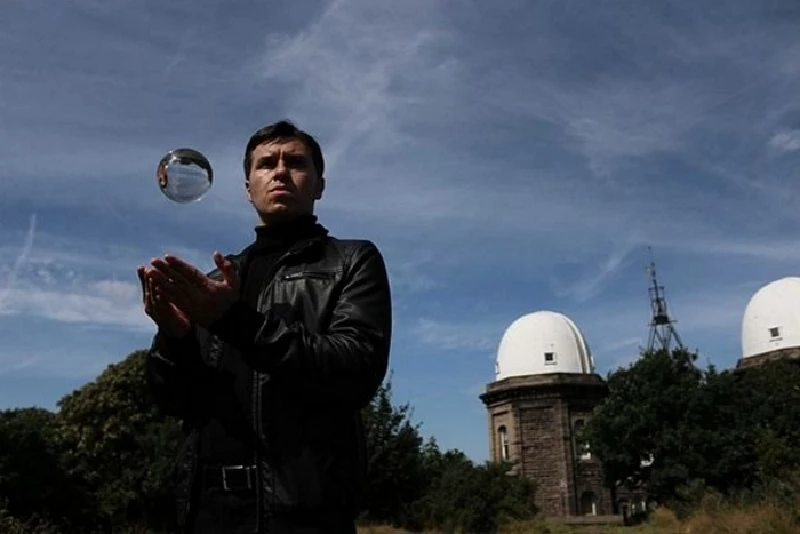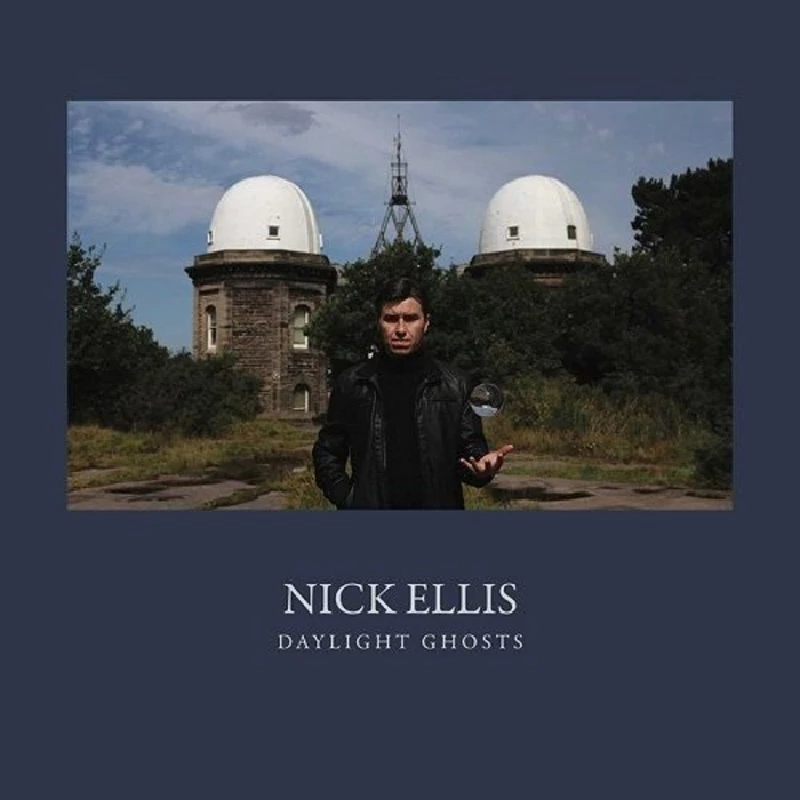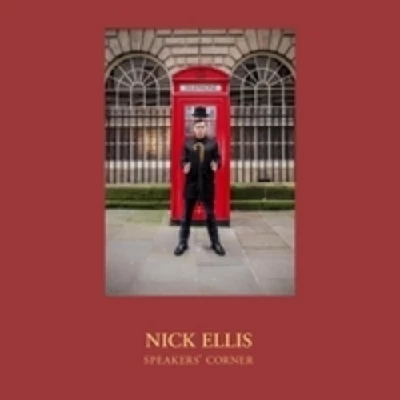Nick Ellis - Interview
by Benjamin Howarth
published: 30 / 6 / 2017

intro
Singer-songwriter Nick Ellis talks to Benjamin Howarth about his extraordinary debut album 'Daylight Ghosts' and his early musical influences
‘Daylight Ghosts’, the debut album from Liverpool songwriter Nick Ellis, has the feel of an album its creator has been waiting years to make. Rather than limiting himself to one musical style and pretending that is all ever wanted to do, Ellis takes us on a guided tour through his many musical enthusiasms – from delicate folk to shaggy indie rock to classic rock ‘n’ roll. Imagine Richard Hawley with a Liverpool accent covering Shack classics, and you’d have some idea of where this album takes you. Having thoroughly enjoyed listening to his debut solo album, but realising we knew almost nothing else about him, we asked him some questions. His answers below tell you everything you need to know and show us where the enthusiasm and love of music come from. PB: To begin, tell me a bit about when you first became a musician. You are clearly a very experienced guitarist – when did you first start playing the guitar and how long was it before you started writing songs as well? NE: I first became interested in the guitar when I was about four or five. My father had this dark brown classical guitar that sat brooding in the corner of our living room that he'd picked up on his travels in Spain. It fitted right in with the decor; everyone's home in the late 70's/early 80's was decorated in such exotica as wood and bamboo. Not too different from a setting in some Blaxploitation movie. This guitar seemed to exude smells of foreign places and I was attracted to that - it's presence. It could never be tuned because the pegs were stiff from years of neglect but I'll never forget my father sitting in the back yard strumming it one summer evening as dusk came down. It was still, to this day, the coolest thing I'd ever seen. That image stayed with me and I thought, "I want to do that." I think we still have it in the house but it accumulated dents, dust and a large crack, due to a cousin sitting on it, over the years. Although it couldn't be tuned, I plucked away at it and found melodies and invented my own chords. This was about 1984 or 1985. I first started to play properly when I was eight in 1988 having been inspired by Guns n' Roses' first album 'Appetite for Destruction', which was actually the first album I went out and bought off my own bat after I seeing this Guns concert on the TV late one Friday night, on BBC2, when my mum and dad were out. It was called 'Live at The Roxy'. It blew me away, the whole attitude, the energy, the crowd, the musicians and the songs. That's what I liked about Guns. Their songs had this wild, dangerous imagery and their stories painted this picture of living in a city on the verge of a meltdown. Much like the area where I grew up. "Welcome to the Jungle/It gets worse here every day" - now I could relate that. Later on, they just became silly and annoying. It's funny, because all the other kids were busy swapping football stickers, playing football etc and here I was reading 'Kerrang!' and checking out Lemmy with a rock chick on each arm every other week. As you can imagine, it was very appealing. Not long after all this caper, I started to write 'rock' songs, albeit very badly. Stupid stuff about skulls, girls, bars and rock n' roll. Stuff I didn't even understand. I was imitating what I was hearing and trying to figure stuff out, using my imagination. It was great. It was a few years before I was allowed an electric guitar and even that was a birthday and Christmas present combined. So, I kept on plucking at the classical (I always loved their tone since). We're are talking 1991, now. I begged my dad to get me one and he said, "No way, you'll get bored of it - you can have an acoustic." And, I was like like, "Fuck that shit, i'm serious. I need power, man." My mum and dad were Mods back in the mid-sixties, watching the Stones, the Who and the Motown tours - they knew the score. Eventually, my Dad caved in and said he would buy me an electric if I proved I was dedicated. So, I got my head down and practised like a possessed fucker. God bless him, he was true to his word and worked his arse off to put money away and buy me my first electric guitar and amp. I'll always love and respect my dad for showing me that belief. My parents were cool as fuck - still are. None of this "Peter, put your slippers on. What are you doing with your life? Turn that down2 shit. I never asked them for a single thing since. Guitars were expensive back then and made well - not like now, with all this cheap shit from China. PB: How long have you been performing – were you ever in bands before starting to perform as a solo artist? NE: The first performance I ever did was in November 1992 in Liverpool's Catholic Cathedral for my secondary school's 200th anniversary and to be honest, I've never played anywhere better since. I had no choice. I was told I was playing it. The sound in there was unique. Never heard anything like it since. It resonates and moves upward in spheres of sound towards its apex; to the heavens. It's a beautiful and graceful building. It was a very profound and powerful experience playing those hymns and still to this day I can respect religious music and its movements from all cultures because of it. For the occasion, I was given a cheap £20 Classical Hohner guitar by my mother and, still to this day, it's my main guitar. The one I write everything on. The one I practice on. I don't use it live, but it gets used when recording. It's warm and smooth. Perfect beauty. I started playing in bands when I was sixteen with a songwriting friend from my English Literature class called Neil Condron who went on to become a writer. We're talking 1996, here. Still to this day, I've never heard a better songwriter. For narrative, character and plot, Neil is the man. he writes for himself nowadays. He's too good, too precious, for this game. We were inspired by bands like Shack, the Verve, Ocean Colour Scene, the La's, The Pale Fountains and Love. Basically, songs were the order of the day. We created a band called the Maybes? which I ended up performing in till 2010, but that's another story in itself. I did all the usual business of rehearsing, touring, recording albums, building our own studio, working with producers, signed a publishing deal, sacked a few managers, got ripped off, members came and went. The usual story. The one thing it taught me was to trust my own judgement because all these other idiots didn't have a clue. Hence the reason for producing 'Daylight Ghosts' in the manner in which I did. PB: The songs on ‘Daylight Ghosts’ jump around from style to style, and suggest you have a wide range of musical interests. How did you go about choosing and sequencing the songs that appear on the album? NE: The songs on the album are sequenced in an order of narrative rather than musical style. It is interesting how they panned out like that. The narrative is meant to lead the listener/reader through a series of 'short stories' or incidental scenes which, in turn, allow them to visualise or empathize with their characters or mood. It's not a straight narrative in any particular order, like chapter 1. and chapter 2. It's more to do with the emotional journey of these particular 'Ghosts' in question. There are twelve different 'Ghosts' on the album, each of which exist in their own particular time and place. But, obviously, the listener absorbs this to create their own interpretation. PB: How often do you write songs? Are you already writing songs for a new album or are you happy to focus on playing the songs from ‘Daylight Ghosts’? NE: I tend to write songs after a good idea, theme, concept or lyric has outstayed its welcome in my mind. If it hangs around for long enough then it's worth pursuing to its finality. I don't tend to write a load of songs just for writing sake. Some do, I just don't. I don't like having illegitimate songs hanging around. They can take up too much of your energy. I used to write a lot of shit when I was younger and when I was on the books at Universal Publishing. But, nowadays, it's not my bag. I wrote all the songs for the next album over the last seven years. The new bunch seem to fit together as a whole concept. They've seemed to gather naturally and gravitated to a particular conclusion, which is the theme of 'love in the adult night'. At the moment, I'm mainly playing songs from 'Daylight Ghosts' and the 'Grace & Danger' EP with a couple from the new album. Personally, I feel the two bodies of work, the old and new, to be very different. The new ones are darker. PB: Your home of Liverpool is clearly an important influence on your lyrics – what are you hoping people who aren’t from Liverpool are going to feel about the city from your music? NE: Yes, the city has had a profound influence on my writing; its day to day drama and its history, for example. I hope people from other places can listen to my music and create their own headspace and dreamscapes from the stories. After all, these stories are nothing new. Everyone feels love, loss, loneliness and euphoria. I hope it paints a picture of life that is akin to their own. That's the connection - to realize that there is other people out there feeling the same feelings as themselves. PB: Do you see yourself as part of a wider Liverpool music scene, or are you doing your own thing? NE: I'm doing my own thing and I always have. I write songs and get on with my day to day life. I see myself as someone on the outside looking in at a party you wouldn't want to go to. You know, it looks great from the window but there's a load of dicks dancing about acting silly. I'm not middle class, I haven't got time to fuck about. I suppose, I am a part of a bunch of singer-songwriters who have been around for a while, though. On the other hand, there are lots of great songwriters and lots of very supportive people about. People believe in good music, here. In fact, they demand a level of quality and progression. Most people I know on the 'folk-scene' are genuinely friendly. There are plenty of mother fuckers about, though. I'm in a good mood today, so I will save that for the next interview. PB: The album was recorded in a single session. Why did you choose to record in that way and do you think that changed how the album sounded? PB: I chose to record the album in that way to retain an immediacy to the songs. I wanted a sense of time and place. The sense of 'something happened' and it was captured. I wanted the listener to feel the story coming from my soul. Recording in this way breathed a whole different life into the songs and as an album felt more organic and alive. You can feel the air around the song, hear the room react to a certain word and feel both a sense of time and timelessness. PB: Is that something you would repeat on your next records? NE: Yes. I think folk songs should be recorded as such. I felt that was what was missing from singer songwriter stuff, the sense of "performance". And, that sense of performance is a document. It's real; something you can actually hear that isn't processed. The music is me singing directly to the listener. I think that sense of connection has been missing from music for a while now. Listen to Dylan's 'Highway 61 Revisited'. There's a connection there. It's alive with electricity and adrenalin. PB: The record has been available for almost six months now – are you happy with how it has been received? NE: Yes, I'm very happy with how it has been received. People who can get into it seem to connect with it on a personal level that is much deeper than I'd ever have guessed. People come up to me sometimes, out of the blue, and talk about the songs and words as if they were their own. I'm surprised they even know who I am, never mind being able to give a whole different philosophy and interpretation on one of the characters in the tunes. And, I guess now, the tunes do belong to these people. After all, that's the purpose of 'Folk Songs' - to pass on the story. PB: What are your plans for the rest of 2017 – do you have any shows or tours lined up, or any plans to record new music? NE: I've recorded the next album and I'm currently mixing and putting the songs into some coherent concept. So, my plans for 2017 is to get the next album out in the autumn and keep on playing. Keep moving and to try and make some sense of this life. Hopefully, I'll be able to translate some kind of answers into songs to lift that load from people's minds. Life is hard and that's what thousands of years of songs have taught me. PB: When you come to look back on your musical life, are there any particular ambitions you hope you will have achieved? NE: Yes. To save someone's life with a song. Now, that would be something. PB: Final question – what music are you enjoying listening to at the moment? Are there any new bands or songwriters you particularly recommend? NE: I'm currently listening to the Clientele, Jessica Pratt, Jeb Loy Nichols, Don Cooper, Jim Sullivan, Sagittarius 'Present Tense', Harold Alexander 'Raw Root', the Nuggets Compilation from 1972, Bob Dylan's hefty and poorly mixed 'Biograph', Robbie Basho, Allah Las and Clayhill. I'm currently reading Celine's 'Journey to the End of the Night' and Raymond Carver's 'Collected Poems: All of Us'. PB: Thank you.
Band Links:-
https://en-gb.facebook.com/Nick-Ellis-Music-133381333379089/https://twitter.com/nickellis_music
Picture Gallery:-

soundcloud
reviews |
|
Speakers' Corner (2018) |

|
| Politically and socially conscious latest album from Liverpool-based singer-songwriter Nick Ellis that gives voice to twelve individual characters |
| Adult Fiction (2017) |
| Daylight Ghosts (2017) |
most viewed articles
current edition
Carl Ewens - David Bowie 1964 to 1982 On Track: Every Album, Every SongArmory Show - Interview with Richard Jobson
Colin Blunstone - Thalia Hall, Chicago, 16/7/2025
Bathers - Photoscapes 1
Visor Fest - Valencia, Spain, 26/9/2025...27/9/2025
Billie Eilish - O2 Arena, London, 10/7/2025
Robert Forster - Interview
Loft - Interview
John McKay - Interview
Editorial - July 2025
previous editions
Heavenly - P.U.N.K. Girl EPManic Street Preachers - (Gig of a Lifetime) Millennium Stadium, Cardiff, December 1999
Oasis - Oasis, Earl's Court, London, 1995
Beautiful South - Ten Songs That Made Me Love...
Trudie Myerscough-Harris - Interview
Pixies - Ten Songs That Made Me Love...
Prolapse - Interview
Doris Brendel - Interview
Simon Heavisides - Destiny Stopped Screaming: The Life and Times of Adrian Borland
Paul Clerehugh - Interview
most viewed reviews
current edition
Amy Macdonald - Is This What You've Been Waiting For?Sick Man of Europe - The Sick Man of Europe
Alice Cooper - The Revenge of Alice Cooper
Phew, Erika Kobayashi,, Dieter Moebius - Radium Girls
Davey Woodward - Mumbo in the Jumbo
Lucy Spraggan - Other Sides of the Moon
Blueboy - 2
Cynthia Erivo - I Forgive You
Philip Jeays - Victoria
Lapsley - I'm a Hurricane, I'm a Woman In Love
Pennyblackmusic Regular Contributors
Adrian Janes
Amanda J. Window
Andrew Twambley
Anthony Dhanendran
Benjamin Howarth
Cila Warncke
Daniel Cressey
Darren Aston
Dastardly
Dave Goodwin
Denzil Watson
Dominic B. Simpson
Eoghan Lyng
Fiona Hutchings
Harry Sherriff
Helen Tipping
Jamie Rowland
John Clarkson
Julie Cruickshank
Kimberly Bright
Lisa Torem
Maarten Schiethart